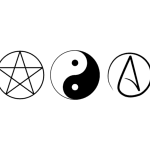Last week our Fearless Leader here at Patheos Pagan, Jason Mankey, rounded up a bunch of us bloggers and locked us in a chat room for an hour and a half to get us to produce some content about the future of Paganism. (I kid, I kid. Commander Mankey hasn’t figured out how to lock us in yet.)
Now as it happens, the subtitle of my book, Why Buddha Touched the Earth (shameless plug), is “Zen Paganism for the 21st Century”. I’ve always held with the old saw that says we should all be concerned about the future, as that is where we will spend the rest of our lives; and I’ve given considerable thought to the topic of Paganism and the future.

It strikes me that the word we often use to talk about the contemporary Pagan movement, “Neopaganism”, has “neo”, “new”, right there in the name, suggesting something that’s looking to the future. I don’t think it’s a coincidence that we have so many computer professionals and engineers and technological, future-looking folk in the Pagan community. The overlap of SF fandom and Paganism is well known. My home gathering, the Free Spirit Gathering, is local to the Space Telescope Science Institute in Baltimore and the Goddard Space Flight Center in Greenbelt and so is heavy with space cadets; you don’t work for NASA without having a future orientation. (Your humble author has worked on software for two space science projects, the ground systems for NASA’s Earth Observing System and the China-Brazil Earth Resources Satellite, though the parts he worked on were concerned with mundane and generic bit-shuffling.)
But on the other hand, we also talk about a revival, suggesting something that’s looking back. Some Pagans talk longingly about the “old ways”, the “old gods”, about rebuilding temples and priesthoods modeled after those prevalent thousands of years ago.
Now, it’s not a bad thing to look back. Sometimes we drop something along the way and need to double back to pick it up. To take a recent example, Target’s decision to desegregate its toy department by gender has been in the news a lot recently — and some pundits have pointed out that it is actually a return to the status quo of a few decades ago, that there was much less gender-based marketing of toys in the 70s and 80s — or even in the 1950s! Social progress is not monotonic.
I don’t generally hold with mythologies of a fall from a past golden age, about an Eden or a Satya Yuga. But sometimes we go astray. Sometimes there are dark ages. Sometimes, some things really were better in the old days.
But only some things.
From time to time I encounter Pagans who seem so focused on what we’ve lost during the dominance of Abrahamic monotheism — and there is much — that they ignore the social and scientific advances we’ve made during that time.
We’re not going back, nor — if we consider the matter carefully — should we want to. Whether we identify as “humanistic Pagans” or “hard Polytheists” or whatever, the future will not be like the past, and past solutions will be inadequate to it. My respected colleague John Beckett speaks of a “polytheist restoration” but also wisely notes that “the polytheism of the future must fit the society of the future” and asks, “What does the future need?”
We should learn from the past, recover from it useful tools and techniques that have been lost. But what we are building must look forward to the future. A mere restoration of something that failed before will not serve us.
You can keep up with “The Zen Pagan” by subscribing via RSS or e-mail.
If you do Facebook, you might choose to join a group on “Zen Paganism” I’ve set up there. And don’t forget to “like” Patheos Pagan and/or The Zen Pagan over there, too.














